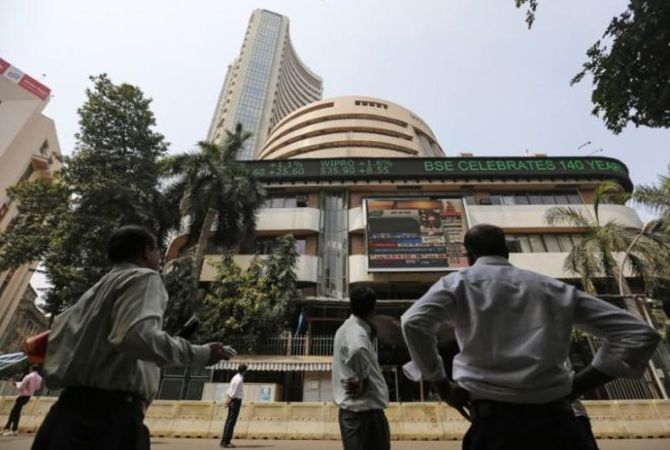'It is easy to dramatise the events of today, but it is far more important to focus on the fact that we have a radically overvalued financial sector. It is a house of cards.'
Samie Modak reports.

The stock markets on Friday, September 21, witnessed one of the most volatile days this decade as the benchmark Sensex swung nearly 1,500 points, or 4 per cent, in intra-day trade.
The source of volatility was a crash in stocks of non-banking financial companies (NBFCs), led by Dewan Housing Finance Corporation (DHFL) and Indiabulls Housing Finance.
A sharp fall in shares of Yes Bank following the Reserve Bank of India's directive to its chief, Rana Kapoor, to step down in January also weighed on market sentiment.
Shares of Yes Bank, which ended 29 per cent lower, accounted for 60 per cent of the Sensex fall.
The benchmark Sensex, after dropping to a low of 35,994, managed to end just 280 points, or 0.75 per cent, lower at 36,842, thanks to gains in index heavyweights such as ITC, Tata Consultancy Services, and Reliance Industries.
The Nifty, after dropping 480 points (4.2 per cent) from its intra-day high, closed at 11,143, down 91 points, or 0.8 per cent.
The broader market Smallcap indices fell nearly 4 per cent.
The real pain, however, was felt by banks and financial stocks.
NBFCs, largely dependent on wholesale funding, tanked on fears that liquidity conditions are tightening due to a broader fallout of the crisis at IL&FS and near-term factors like quarter-end demand for funds.
DHFL, after dropping 60 per cent, ended 42.43 per cent lower, its worst single-day fall.
Indiabulls Housing Finance, after dropping 35 per cent, ended 8.2 per cent down.
Several NBFC stocks witnessed wild gyrations, with the BSE Finance index falling 6.6 per cent intra-day.
Experts said the market fall was aggravated due to a sudden winding up of leveraged bets by panic-stricken investors.
Speculation that the RBI is planning to tighten norms for NBFC funding to address governance concerns added to market woes.
"It is easy to dramatise the events of today, but it is far more important to focus on the fact that we have a radically overvalued financial sector. It is a house of cards. A correction was long overdue and it finally appears that we are entering one," Saurabh Mukherjea, founder, Marcellus Investment Managers, said.
Financial stocks were overvalued by more than 30 per cent, he added.
Analysts said NBFC stocks had a dream run between 2013 and 2017 as the cost of wholesale funds halved during this period.
The good performance during the period saw investors pile on to the sector, resulting in skyrocketing valuations.
With surging yields amid decline in the rupee and fears of widening fiscal and current account deficits, the cost of funds -- a raw material for NBFCs -- is on the rise.
"Wholesale-funded lenders grew rapidly and the stock markets got carried away with that. Hope the investors understand the fragile nature of the boom and cash out sooner than later," said Mukherjea.
A secondary market transaction involving DSP Mutual Fund and DHFL raised the alarm over tight liquidity conditions and rising rates.
During the week, DSP MF, to boost its cash holdings, sold DHFL papers worth Rs 3 billion at a yield of 10.75 per cent.
Analysts said the deal spooked investors, who feared housing finance companies' margins would erode as borrowing costs escalated.
Realty shares also saw corrections. Also, companies with high debt, including Reliance Communications, Adani Power, and SREI Infrastructure, ended more than 10 per cent lower.
While the broader markets have come under pressure, the headline indices have managed to hold their ground. The Sensex is up 8.2 per cent year to date, most among Asian markets.
"The markets are priced for perfection. The risk-reward is not attractive at all. We would still advice investors to book profit. We are still away from levels where we can buy," said Gautam Chhaochharia, MD and head-India research at UBS.
"We are seeing the narrative is gradually changing with flows into local funds slowing. The global and emerging market narrative has been changing any which ways," he added.
Cash market volumes on Friday were highest ever at Rs 659 billion on the National Stock Exchange.
Also, after huge churn, both foreign portfolio investors and domestic institutional investors ended as net buyers to the tune of Rs 7.6 billion and Rs 5 billion, respectively.
The gross buying and selling by both FPIs and DIIs was also one of the highest ever.












 © 2025 Rediff.com -
© 2025 Rediff.com -